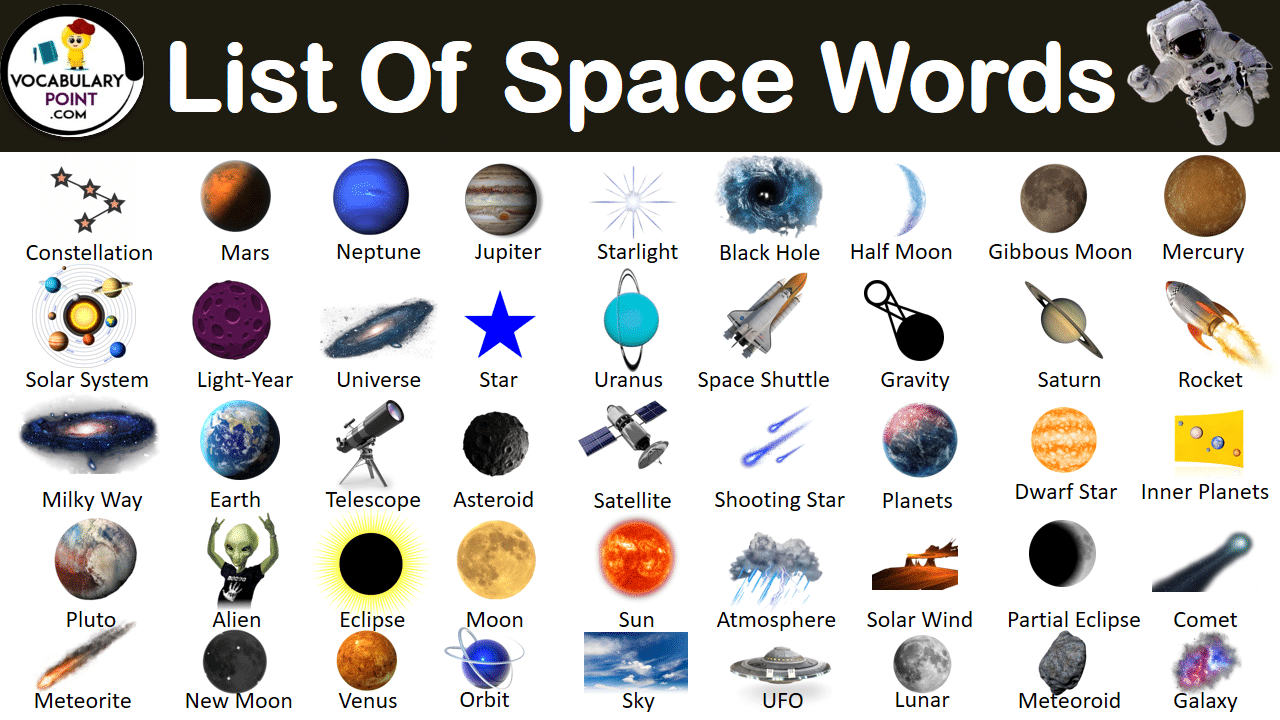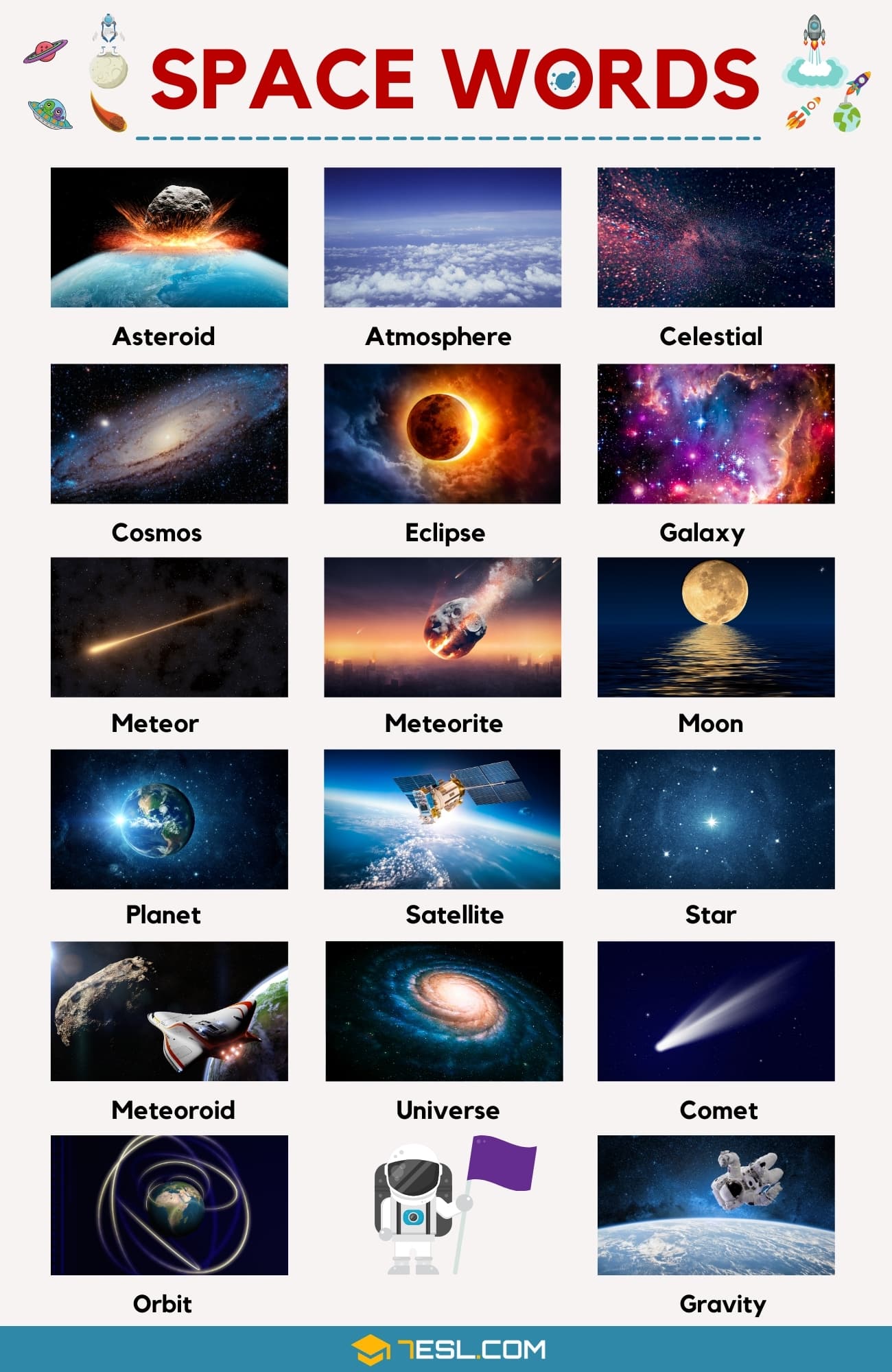Exploring The Cosmos: A Guide To Space Words
What is it about the cosmos that so captivates the human imagination? From the swirling nebulae painted across the night sky to the distant echo of the Big Bang, space holds an undeniable allure, a mystery waiting to be unveiled. Our language, ever evolving, reflects this fascination, offering a lexicon as vast and varied as the universe itself.
Consider the simple elegance of "orbit," a word that describes the celestial dance of planets around stars, moons around planets, a constant interplay of gravity and momentum. Or perhaps "satellite," a term that encompasses both the natural wonders like our Moon and the sophisticated technology we launch into the heavens. These words, seemingly commonplace, hold within them the key to understanding the fundamental mechanics of the universe.
| Term | Definition & Example | Related Fields |
|---|---|---|
| Orbit | The curved path of an object around a star, planet, or moon, due to gravity. Example: The Earth orbits the Sun. | Astronomy, Astrophysics, Space Exploration |
| Satellite | An object that orbits a larger object in space. Can be natural (like the Moon) or artificial (like a communications satellite). Example: The Hubble Space Telescope is a satellite orbiting Earth. | Astronomy, Astrophysics, Space Technology, Telecommunications |
| Galaxy | A vast system of stars, gas, dust, and dark matter held together by gravity. Example: The Milky Way is our galaxy. | Astronomy, Astrophysics, Cosmology |
NASA Website
But our linguistic exploration of space doesn't stop at mere mechanics. We delve into the poetic, using words like "stardust" to evoke a sense of wonder and ancient origins. We embrace the vastness with terms like "cosmos" and "universe," acknowledging the sheer scale of existence beyond our small planet. We even borrow from other disciplines, using "infernal" to describe the scorching temperatures of Mercury, conjuring images of a hellish landscape.
The beauty of space-related vocabulary lies in its ability to connect us to something larger than ourselves. These words are not just scientific jargon; they are tools for storytelling, for sparking curiosity, for inspiring dreams of exploration. Whether we're describing the technical specifications of a spectrograph or simply marveling at the beauty of a crescent moon, the language of space allows us to share our awe and deepen our understanding of the universe.
For students, these words are more than just vocabulary; they are gateways to a world of knowledge. Learning the definitions of "astronomy," "astrophysics," and "space exploration" opens doors to exciting fields of study. Engaging with the nuances of these terms fosters critical thinking and a deeper appreciation for the scientific process.
Even beyond the classroom, space words offer a rich source of creative inspiration. From writing poetry to crafting compelling science fiction stories, the lexicon of space allows us to explore new worlds, both real and imagined. Consider the evocative power of "enchanted" when describing a distant nebula, or the dramatic impact of "astronomical" when discussing the distances between galaxies. These words add depth and richness to our narratives, transporting readers to the far reaches of the cosmos.
In a world increasingly focused on the tangible, space words remind us of the intangible wonders that lie beyond our grasp. They encourage us to look up, to question, to explore. They remind us that language, like space itself, is a vast and ever-expanding frontier, waiting to be discovered.
So, the next time you find yourself gazing at the stars, take a moment to consider the words we use to describe them. You might just find that the language of space is as captivating as the cosmos itself.
This exploration of vocabulary extends beyond simple definitions. We can delve into the etymology of these words, tracing their origins back through history and across different cultures. We can examine how their meanings have evolved over time, reflecting our changing understanding of the universe. And we can explore the diverse ways in which these words are used in different contexts, from scientific journals to popular science articles to works of fiction.
The study of space words is, in essence, a study of human curiosity. Its a testament to our enduring fascination with the unknown and our unwavering desire to understand our place in the cosmos. So, embrace the language of space, explore its depths, and let it ignite your own journey of discovery.



Detail Author:
- Name : Miss Sabrina Effertz V
- Email : pkreiger@hotmail.com
- Birthdate : 2002-12-10
- Address : 52055 Erich Rapids North Salmaland, VT 57418
- Phone : +1-458-916-7977
- Company : O'Conner-Littel
- Job : Portable Power Tool Repairer
- Bio : Sint est impedit in accusamus. Cupiditate accusantium et quia. Nisi voluptatem omnis quaerat beatae. Quia voluptate vero nemo optio ab ex maiores.